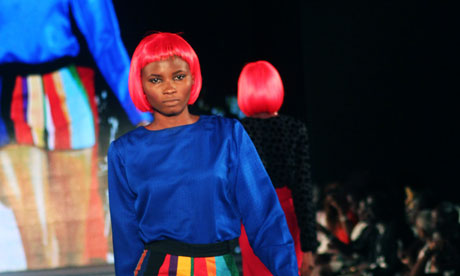"Milan, London, New York and Paris. Why not Lagos?" says organiser of Africa Arise showcase for rising African designers

Not so long ago, the idea of an African fashion scene was an optimistic stretch. Now, the organisers behind the Arise Africa fashion week believe those days could soon be very last season.
Inaugurated in Cape Town in 2009, the event this year, which ended on Sunday and took place in Nigeria's vibrant commercial capital, was such a success that organisers plan to make Lagos a major fixture in the global fashion calendar, and take their designs around the world.
"You've got Milan, London, New York and Paris. Why not Lagos?" organiser Penny McDonald said. "We've been invited to showcase in New York, and to return to Cape Town and other places, but there's such an appetite for fashion in Lagos that we were comfortable with a vision for making this the fifth fashion capital of the world."
It started almost two days late, but the show eventually lived up to its name. For one week, Lagos was graced with glamour, cries of "Hello darling!" and fashion high priests such as Ozwald Boateng and supermodel Alek Wek. Backstage more than one temper tantrum ensued over improperly steamed dresses and nail polish colour choices, while ladies sharpened their elbows to catch a glimpse of male model and reported Rihanna love interest Dudley O'Shaughnessy.
Seventy-seven rising African or African-based designers were whittled down to five winners to show at next year's New York fashion week, the glamour queen of all fashion weeks. Among them was Boateng, the youngest and first black man to open a shop in London's prestigious Savile Row.
From Abidjan, the capital of Ivory Coast, known as the "Paris of Africa", to fashion deserts such as Somalia, entourages were flown in to Lagos on all-expenses paid trips funded by the show's founder Nduka Obaigbena, an ebullient Nigerian media baron nicknamed The Duke. "This is about putting Africa on the map. There is an African brand of style, elegance and beauty," Obaigbena, dressed head-to-toe in white, said as he mingled among fashionistas, an apparently bottomless martini in hand.
Nigerians don't do things by halves when it comes to fashion, and the shows rivalled the creative talent found in global fashion hotspots. Long-legged women – and a few men – in heels tottered across polished marbled floors. Runway lights glittered off sequinned bosoms and music pumped as models sashayed down the catwalks. Any wardrobe malfunctions were eagerly applauded.
For designers struggling to break through preconceptions in the European-dominated industry, the week was a chance to shine. "I don't subscribe to the school of thought that there is such a thing as African fashion. I think the whole print fabric and ankara [a traditional west-African lace fabric] thing is limiting," said Fatima Garba, whose House of Farrah boutique attracts moneyed crowds in the capital, Abuja. "It's overdone and overplayed. It's always animal prints or tribal or whatever. I want to design clothes that an African lady or a woman in Alaska feels they can wear. I prefer to go left when everyone is going right," she added, dressed in towering red heels and a sparkling purple top.
Nigerian designer Maki Oh's models paraded down the runway in suits whose frills and sheer materials would perhaps be a little too va-va-voom for the office, but will look at home when she displays on the New York catwalks this coming September. Also chosen to accompany her was South African Gavin Rajah, whose flowing pastel clothes elicited wistful sighs from the audience, and the UK-based Tsemaye Binitie.
Tradition-inspired clothes made an appearance too, ranging from tiny native corals woven into Kinabuti's clothes (showcased by models from Nigeria's coastal cities), to bold prints from South African label PPQ. Delicious pastel colours were draped in ways that recalled Sahelian nomadic clothes by Nigerian brand Amede.
But even fashion isn't immune to the everyday problems that frustrate Nigerians. The country's electricity supply is notoriously erratic, averaging four hours a day. The first day of the show was almost scrapped after generators needed to power the dozens of marquees and glittering lights had broken down.
The textiles industry is also more than a little threadbare. In an attempt to boost it, Nigeria's government has belatedly lifted a ban on importing materials. But northern-based cotton mills and dye-houses, once frequented by Italian designers in search of top quality fabrics, have fallen into disrepair as decades of successive governments have focused on the oil-rich south.
Still, the event showed a glimpse of how the continent's fashion industry could grow. "It's amazing. Nigerian fashion has evolved so much. The talent has always been there but we're not used to seeing it showcased like this. I am blown away," said Uti Nwachukwu, the winner of last year's Big Brother Africa. "I keep seeing strong, sexy and confident clothes. It's awesome. It's like my taste in women walking down the catwalk," he added, surrounded by a gaggle of breathless female fans.
(If would like to share with friends friends on the facebook, use the "f" bellow or the share link on the facebook.)

“If you love unique fashion, stop scrolling and click. ModaMira is unbelievable!https://dev-modamira.pantheonsite.io/wp-admin/edit.php
ReplyDelete